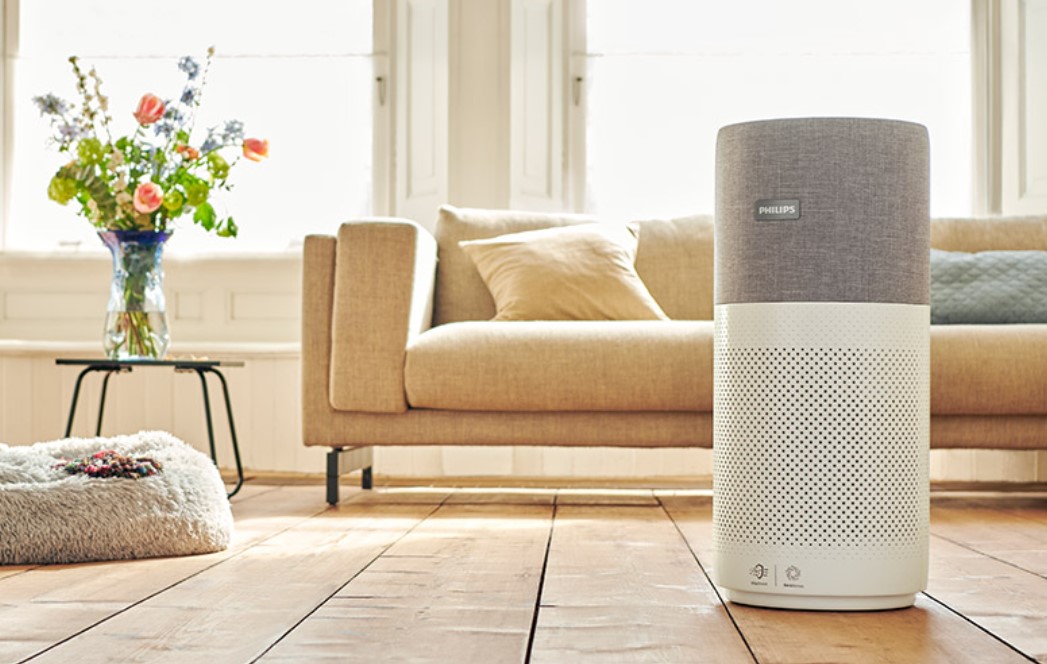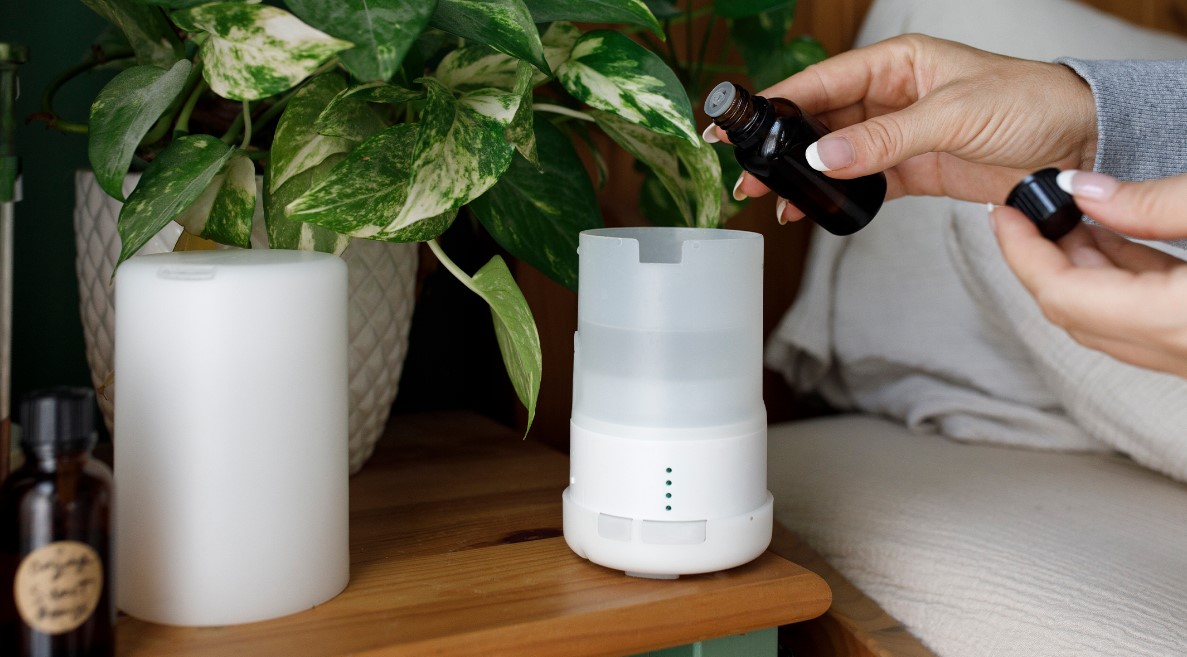14 Best Ways To Clean The Air In Your Home
The quality of indoor air can be up to five times more polluted than outdoor air. Research indicates that people usually spend about 90% of their time indoors, making this issue a significant concern. Poor air quality can have a negative impact on your well-being. Thus, it is important to clean the air in your home to reduce indoor air pollution and maintain proper ventilation. In this article, we’ll explore the 14 best ways to clean the air in your home for a cleaner and healthier living environment.
14 Best Ways to Clean the Air in Your Home
1. Use an air purifier

If you suffer from allergies, having an air purifier may help relieve the symptoms. These devices can integrate with central air systems and capture as much as 99% of larger particles, including pollen and pet dander. When choosing a suitable air purifier for your home, opt for a model rated MERV-13 or higher. If you don’t have a central air system, a HEPA filtration unit alone can be highly efficient within a room, though not for the entire house. You can put it in the area where you spend most of your time, like your living room or bedroom.
2. Do not allow smoking indoors
One of the most harmful airborne pollutants is secondhand smoke. Every year, thousands of children end up in hospitals or suffer from respiratory problems due to it, while older adults with cardiovascular or lung diseases face a higher risk of health issues. Therefore, it is crucial to prohibit smoking within your home and request smokers to take their cigarettes outside.
3. Fill your house with plants

Plants can act as effective natural purifiers within your living space. NASA‘s Clean Air study pioneered the idea that plants can clean indoor air of organic compounds such as benzene and formaldehyde. If you are considering purchasing plants to enhance your home’s air quality, English Ivy, Spider plants, and Snake plants are among the best options.
However, keep in mind that a notable drawback of relying on purifying plants is that you will need a lot of them to truly make an impact, and filling your entire home with foliage might not sound like a practical solution.
4. Use eco-friendly cleaning products
Have you ever experienced headaches, fatigue, or discomfort in your eyes and nose after a spring cleaning? These symptoms may result from using products that contain harmful ingredients. Using such products not only harms the environment due to various chemicals and volatile organic compounds (VOCs), but it can also contribute to indoor air pollution. As a result, it is advisable to go with eco-friendly cleaning products as alternatives.
5. Keep your home ventilated

It is perfectly natural to close all doors and windows during the winter season. However, poor home ventilation may lead to condensation and mold buildups, thereby reducing indoor air quality. To prevent this, consider opening a smaller window for at least an hour daily during winter. This allows fresh, well-oxygenated air to enter your home and release accumulated pollutants such as cooking gases and appliance emissions.
6. Install a carbon monoxide detector
Every year, over 400 people lose their lives due to carbon monoxide poisoning, while countless others suffer from illness or require medical treatment after exposure to the odorless gas. The initial symptoms can be similar to the flu. Still, it is crucial to note the differences: If more than one of your family members, including pets, have symptoms, and if you feel better away from your home, there is a chance of carbon monoxide presence.
To enhance your safety, place a carbon monoxide detector close to your sleeping areas. Plus, you can annually arrange for a qualified technician to inspect all fuel-burning appliances to avoid the threat of this lethal gas.
7. Do not idle your car in the garage
Indoor air pollution and deadly carbon monoxide can be produced by burning gas or other fuels inside the house. The emissions from cars or lawnmowers that are operated in enclosed areas, such as garages, can put your health at risk. In addition, it is imperative to only use gas stoves or heaters equipped with outdoor ventilation and refrain from using charcoal grills indoors.
8. Use essential oil diffusers

Certain essential oils, such as tea tree oil, are antibacterial and can be added to DIY household cleaners or applied to the skin to treat minor cuts. Furthermore, these oils even effectively reduce bacteria in the air. Other essential oils such as clove, eucalyptus, and lavender are also proven to decrease dust mites within your home.
9. Take your shoes off
The dirt from outside may include unwanted substances such as pesticides, fungi, pollen, bacteria, and more. As you enter your house, any of these could potentially stick to the soles of your shoes. Hence, you should take off your shoes or swap them for a pair of slippers before getting inside. This will help maintain cleaner indoor air quality and even your floors.
10. Wash towels and mats
To clean the air in your home, make sure to air-dry your towels thoroughly after every use, as leaving them wet can foster the growth of mold. It is best to put them in the washing machine every three days. Mats, on the other hand, can be washed half as frequently. Be cautious when cleaning mats with rubber backings, as they may not withstand frequent washing. If you want a hassle-free option, go for lightweight towels and mats that are safe for machine washing.
11. Strip the window dressings

Curtains and drapes tend to accumulate a considerable amount of dust and dirt. To maintain their cleanliness, you should clean them regularly while following the provided care guidelines. Custom treatments, particularly those with intricate details like pleats, may require dry cleaning, even if made from a durable material like cotton. Instead, you can use a vacuum to effectively clean them.
For a quicker cleaning, consider using blinds, especially those with smooth surfaces, as they tend to trap less dust. With a damp cloth, you can easily restore blinds to their original look without much effort.
12. Keep your pets clean
Pets, especially those with fur, generally shed pet dander indoors. This dander carries a protein that can trigger allergies in certain individuals. For those who are both pet owners and allergic, it is highly advisable to maintain regular vacuuming in all areas of the house, including pet beds.
You should also clean your home right after grooming your pet’s hair or bathing them.
13. Use low-VOC paints
After painting, paints continue to emit small amounts of gases for several months, though they may seem completely dry and have no odors. These emissions are referred to as VOCs or volatile organic compounds. These VOCs contain harmful substances such as formaldehyde and acetaldehyde.

To avoid this, select products labeled as “low-VOC” for paints, waxes, and varnishes. When painting, you should also open all the windows and use exhaust fans to ensure proper ventilation. Remember not to keep open paint containers indoors as well.
14. Kill dust mites
Dust allergies are dust mite allergies, which are tiny pests reliant on moisture to survive. These dust mites feed on human skin and inhabit bedding, pillows, mattresses, stuffed toys, and carpets. To combat dust mites within your living space, consider taking the following measures:
- Regularly vacuum and steam clean your upholstered furniture.
- Use dust mite-resistant covers and frequently wash your bedding with hot water.
- Use a dehumidifier to maintain humidity levels lower than 50%.
Clean The Air in Your Home: FAQs
1: How do I detox the air in my house?
To detox the air in your home, start by ensuring proper home ventilation. You should open windows regularly and use exhaust fans to allow fresh outdoor air to circulate and replace stagnant indoor air. Consider investing in an air purifier with a HEPA filter, as these devices can effectively trap and remove airborne particles such as dust, pollen, and pet dander. Natural air purifiers like indoor plants are also an excellent choice for absorbing pollutants and releasing oxygen.
2: What are the symptoms of poor air quality?
Poor air quality may lead to symptoms such as persistent sneezing, coughing, and shortness of breath, particularly in those with allergies or respiratory conditions. You may experience frequent headaches, fatigue, and difficulty concentrating. Eye, nose, and throat irritation are standard, along with other worsening asthma symptoms. If you notice one or more of these symptoms while indoors, it is a strong indicator of poor air quality.
3: What can I boil to clean the air?
Boiling natural ingredients can be a simple way to clean the air in your home. Citrus fruits like lemons and oranges release a pleasant aroma and can help neutralize odors. Herbs like rosemary and thyme, as well as spices like cinnamon and cloves, can infuse the air with delightful scents. Eucalyptus leaves are also known for their respiratory benefits when boiled. For personal comfort, you can experiment with different elements to create a soothing and rejuvenating ambiance while naturally enhancing air quality.
Bottom Line
It is always beneficial to regularly clean the air in your home, though it may take a few weeks to notice the health benefits of cleaning. Doing so allows you to breathe in clean, fresh air instead of being exposed to harmful chemicals, pet dander, and mold spores that accumulate over time. Cleaner air can also relieve people with allergies or skin conditions like eczema. Generally, you should always seek advice from your medical professional, particularly if you have severe health problems.
Related Articles